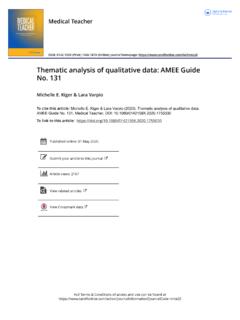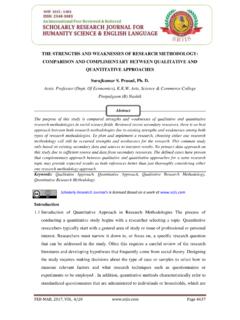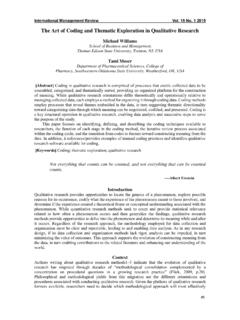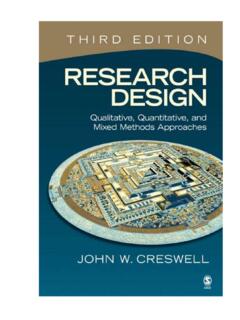Transcription of Philosophical Assumptions and Interpretive Frameworks W
1 2 Philosophical Assumptions andInterpretive Frameworks Whether we are aware of it or not, we always bring certain beliefs and philosophicalassumptions to our research . Sometimes these are deeply ingrained views about the types ofproblems that we need to study, what research questions to ask, or how we go about gatheringdata. These beliefs are instilled in us during our educational training through reading journalarticles and books, through advice dispensed by our advisors, and through the scholarlycommunities we engage at our conferences and scholarly meetings. The difficulty lies first inbecoming aware of these Assumptions and beliefs and second in deciding whether we willactively incorporate them into our qualitative studies.
2 Often, at a less abstract level, thesephilosophical Assumptions inform our choice of theories that guide our research . Theories aremore apparent in our qualitative studies than Philosophical Assumptions and theories are madeexplicit for us in our scholarly training and in report research researchers have underscored the importance of not only understanding thebeliefs and theories that inform our research but also actively writing about them in our reportsand studies. This chapter highlights various Philosophical Assumptions that have occupied theminds of qualitative researchers for some years and the various theoretical and interpretiveframeworks that enact these beliefs. A close tie does exist between the philosophy that onebrings to the research act and how one proceeds to use a framework to shroud his or herinquiry.
3 This chapter details the various philosophies common to qualitative research andwhere both philosophy and theory fit into the large schema of the research process. Types ofphilosophical Assumptions , and how they are often used or made explicit in qualitative studies,are advanced. Further, various Interpretive Frameworks are suggested that link back tophilosophical Assumptions . Commentary is made on how these Frameworks play out in theactual practice of FOR DISCUSSIONW here do philosophy and theoretical Frameworks fit into the overall process ofresearch?Why is it important to understand the Philosophical Assumptions ?What four Philosophical Assumptions exist when you choose qualitative research ?How are these Philosophical Assumptions used and written into a qualitative study?
4 What types of Interpretive Frameworks are used in qualitative research ?How are Interpretive Frameworks written into a qualitative study?How are Philosophical Assumptions and Interpretive Frameworks linked in a qualitativestudy? Philosophical ASSUMPTIONSAn understanding of the Philosophical Assumptions behind qualitative research begins withassessing where it fits within the overall process of research , noting its importance as anelement of research , and considering how to actively write it into a Framework for Understanding AssumptionsPhilosophy means the use of abstract ideas and beliefs that inform our research . We know thatphilosophical Assumptions are typically the first ideas in developing a study, but how theyrelate to the overall process of research remains a mystery.
5 It is here that the overview of theprocess of research compiled by Denzin and Lincoln (2011, p. 12), as shown in Table ,helps us to place philosophy and theory into perspective in the research research process begins in Phase 1 with the researchers considering what they bring tothe inquiry, such as their personal history, views ofTable The research ProcessPhase 1: The Researcher as a Multicultural SubjectHistory and research traditionConceptions of self and the otherThe ethics and politics of researchPhase 2: theoretical Paradigms and PerspectivesPositivism, postpositivismInterpretivism, constructivism, hermeneuticsFeminism(s)Racialized discoursesCritical theory and Marxist modelsCultural studies modelsQueer theory PostcolonialismPhase 3: research StrategiesDesignCase studyEthnography, participant observation, performance ethnographyPhenomenology, ethnomethodologyGrounded theoryLife history, testimonioHistorical methodAction and applied researchClinical researchPhase 4: Methods of Collection and AnalysisInterviewingObservingArtifacts, documents, and recordsVisual methodsAutoethnographyData management methodsComputer-assisted analysisTextual analysisFocus groupsApplied ethnographyPhase 5: The Art, Practice, and Politics of Interpretation and EvaluationCriteria for judging adequacyPractices and politics of interpretationWriting as interpretationPolicy analysisEvaluation traditionsApplied researchSource: Denzin & Lincoln, 2011, p.
6 12. Used with permission, SAGE and others, and ethical and political issues. Inquirers often overlook this phase, soit is helpful to have it highlighted and positioned first in the levels of the research process. InPhase 2 the researcher brings to the inquiry certain theories, paradigms, and perspectives, a basic set of beliefs that guides action (Guba, 1990, p. 17). It is here in Phase 2 that we findthe Philosophical and theoretical Frameworks addressed in this chapter. Following chapters inthis book are devoted, then, to the Phase 3 research strategies, called approaches in thisbook, that will be enumerated as they relate to the research process. Finally, the inquirerengages in Phase 4 methods of data collection and analysis, followed by Phase 5, theinterpretation and evaluation of the data.
7 Taking Table in its entirety, we see that researchinvolves differing levels of abstraction from the broad assessment of individual characteristicsbrought by the researcher on through the researcher s philosophy and theory that lay thefoundation for more specific approaches and methods of data collection, analysis, andinterpretation. Also implicit in Table is the importance of having an understanding ofphilosophy and theoretical orientations that informs a qualitative Philosophy Is ImportantWe can begin by thinking about why it is important to understand the philosophicalassumptions that underlie qualitative research and to be able to articulate them in a researchstudy or when presenting the study to an audience.
8 Huff (2009) is helpful in articulating theimportance of philosophy in research . It shapes how we formulate our problem and research questions to study and how weseek information to answer the questions. A cause-and-effect type of question in which certainvariables are predicted to explain an outcome is different from an exploration of a singlephenomenon as found in qualitative research . These Assumptions are deeply rooted in our training and reinforced by the scholarlycommunity in which we work. Granted, some communities are more eclectic and borrowfrom many disciplines ( , education), while others are more narrowly focused on suchresearch components as specific research problems to study, how to go about studying theseproblems, and how to add to knowledge through the study.
9 This raises the question as towhether key Assumptions can change and/or whether multiple Philosophical Assumptions canbe used in a given study. My stance is that Assumptions can change over time and over acareer, and they often do, especially after a scholar leaves the enclave of his or her disciplineand begins to work in more of a trans- or multidisciplinary way. Whether multipleassumptions can be taken in a given study is open to debate, and again, it may be related toresearch experiences of the investigator, his or her openness to exploring using differingassumptions, and the acceptability of ideas taken in the larger scientific community of whichhe or she is a part. Unquestionably reviewers make Philosophical Assumptions about a study when theyevaluate it.
10 Knowing how reviewers stand on issues of epistemology is helpful to author-researchers. When the Assumptions between the author and the reviewer (or the journal editor)diverge, the author s work may not receive a fair hearing, and conclusions may be drawn thatit does not make a contribution to the literature. This unfair hearing may occur within thecontext of a graduate student presenting to a committee, an author submitting to a scholarlyjournal, or an investigator presenting a proposal to a funding agency. On the reverse side,understanding the differences used by a reviewer may enable an author-researcher to resolvepoints of difference before they become a focal point for Philosophical AssumptionsWhat are the Philosophical Assumptions made by researchers when they undertake aqualitative study?





